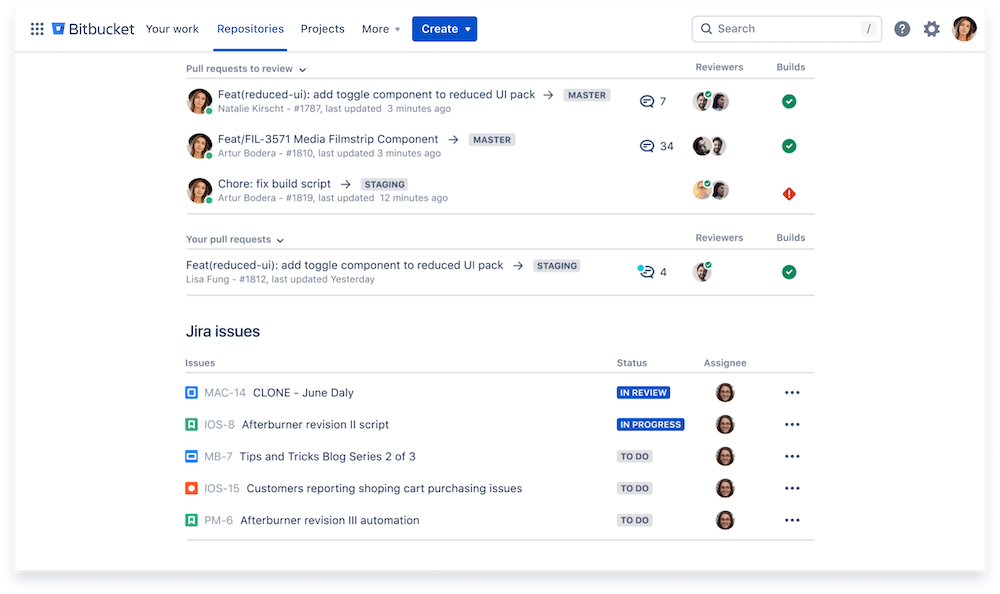Bitbucket is a Git-based code and CI/CD tool optimized for teams using Jira. It empowers development teams to collaborate effectively, manage code repositories, and automate their workflows, all within a secure and scalable environment.
Bitbucket Key Features
Git Repository Management
Securely host and manage Git repositories with fine-grained access control, ensuring code integrity and collaboration. Supports unlimited private repositories for teams of all sizes.
Pull Requests
Streamline code review with intuitive pull requests, enabling collaborative feedback, inline comments, and approvals before merging changes. Seamlessly integrates with Jira for issue tracking and resolution.
Branch Permissions
Control code access with granular branch permissions, restricting who can commit, merge, or delete branches. Protect sensitive code and maintain code quality.
Bitbucket Pipelines
Automate CI/CD workflows with built-in Pipelines, enabling continuous integration, automated testing, and seamless deployments. Supports Docker and integrates with popular cloud platforms like AWS and Azure.
Jira Integration
Deep integration with Jira allows developers to link code changes to Jira issues, providing end-to-end traceability and improved collaboration between development and project management teams. Track progress, resolve issues, and release with confidence.
Deployment History
Track deployments across environments and gain insights into the release process. Visualize deployment status, identify bottlenecks, and ensure smooth releases.
Code Insights
Gain valuable insights into code quality, security vulnerabilities, and performance bottlenecks with integrated code analysis tools. Identify and address issues early in the development lifecycle.
How Bitbucket Works
Bitbucket provides a centralized platform for managing Git repositories and automating development workflows. Developers can create repositories, commit code changes, submit pull requests for review, and automate CI/CD pipelines using Bitbucket Pipelines. The platform integrates seamlessly with Jira, enabling teams to track issues, link code changes, and manage releases efficiently.
Bitbucket Benefits
Time Savings
Automate CI/CD pipelines, streamline code review, and reduce manual tasks, saving valuable time for developers.
Cost Efficiency
Reduce infrastructure costs with cloud-based Git hosting and CI/CD automation. Pay-as-you-go pricing plans scale with your needs.
Enhanced Collaboration
Improve collaboration between developers, project managers, and stakeholders with integrated pull requests, issue tracking, and communication tools.
Improved Code Quality
Enforce code quality standards with branch permissions, code reviews, and integrated code analysis tools.
Increased Security
Protect code with fine-grained access control, branch permissions, and security scanning tools.
Streamlined Workflow
Simplify development workflows with integrated CI/CD, issue tracking, and deployment management.
Bitbucket Use Cases
Software Development
Manage code repositories, automate CI/CD pipelines, and streamline software development workflows.
Web Development
Host web application code, automate deployments, and collaborate on web development projects.
Mobile App Development
Manage mobile app code, automate builds, and integrate with mobile app deployment platforms.
Open Source Projects
Host open source code, collaborate with contributors, and manage releases.
Bitbucket FAQs
What is Git?
Git is a distributed version control system that tracks changes to files and enables collaboration on code projects.
What is CI/CD?
CI/CD stands for Continuous Integration and Continuous Delivery/Deployment, a set of practices that automate the software development and release process.
Does Bitbucket integrate with other Atlassian products?
Yes, Bitbucket integrates seamlessly with Jira, Confluence, and other Atlassian products.
Who Should Use Bitbucket
Development teams of all sizes, from startups to enterprises, who use Jira for project management and need a secure and scalable Git solution. Ideal for software developers, web developers, mobile app developers, and open source contributors.
